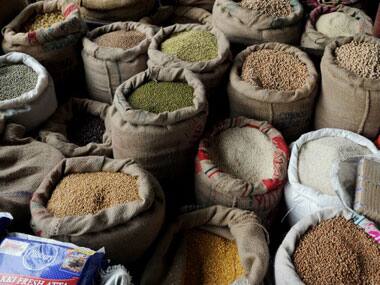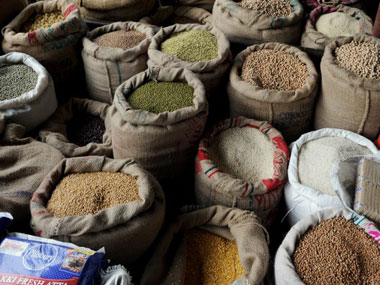With the appeal of both the RTI Act and Manmohan Singh’s two-decade old economic wizardry already in tatters, the UPA is in dire need of a poll weapon that’ll help them draw a cover on its trail of scams, economic policy failures and administrative mismanagement. With not many options in sight, the ruling party has set its sight on who are easily the country’s largest vote bank - India’s poor. No wonder therefore they have lunged behind the Food Security Bill and is fighting tooth and nail to make it a reality. The bill, which aims to provide subsidised food-grains to nearly 67 percent of Indian’s population, has faced the Opposition’s heat for being ‘populist’ and detrimental to the country’s already wobbly economy. According to an article on NDTV, the bill proposes to do away with priority and general classifications of beneficiaries. It will consequently provide uniform allocation of 5 kg food grain (per person) at fixed rate of Rs 3 (rice), Rs 2 (wheat) and Rs 1 (coarse grains) per kg to 75 percent of the country’s rural population and 50 percent of the poor in urban India - a number that adds up to 800 million people. A complete implementation of the scheme will require 61.23 million tonnes of food grains every year and will cost the national exchequer Rs. 1,24,724 crore. Understandably, a Bill of that magnitude is mostly likely to be contested in the political circles and will possibly face a fair amount of opposition. [caption id=“attachment_1046237” align=“alignleft” width=“380”]  Representational image. AFP.[/caption] The Congress, therefore, has braced for all the political eventualities that it might be faced with and has reportedly even warmed up to the idea of amendments, to make sure that the Parliament gives its nod to the Bill. According to reports, to make sure the much-delayed Bill also scores full points in political symbolism, the Congress wants to pass it on Rajiv Gandhi’s birth anniversary. A NDTV report says that in an all-party meet, measures to clamp down on the dissenting Andhra MPs were discussed. One of the suggestions mooted was forcibly ousting the MPs from the Parliament to which Opposition leader Sushma Swaraj didn’t agree to. However, one thing the Congress is almost assured of in regards to the Food Security Bill, is when it is finally allowed passage, it will be passed without stiff opposition. Because, from the parties in Opposition to the dubious allies like the SP, most parties have said that they are willing to let the House approve the Bill, despite having reservations about it. The latest to join the Opposition’s brigade of food bill critics who have said the Bill should be allowed to pass, is senior BJP leader Murli Manohar Joshi. In an interview to The Economic Times, Joshi flayed the Bill saying that it was a political measure to pool in votes, not one that has been formulated to rein in the economy fast slipping out of the government’s hands. He told ET:
Congress is pushing the bill only for political and electoral reasons. Former US secretary for food and agriculture, Earl Butz, once said, “Food is a weapon. It is now one of the principal tools in our bargaining kit.” Similarly, may I say, Congress is now trying to use food as a political tool for bargaining with people for votes in the Lok Sabha polls. Yet, the bill has major flaws.
He goes on to elaborate on the inadequacies of the Food Security Bill by pointing out how the eligibility criteria for people who deserve subsidized food grains is not accurate, therefore, unfairly leaving out people who are entitled to such relief measures. He also points out how 5 kilos of food grains per person per month, minus pulses, is hardly adequate given studies have already established that an adult needs at least 15 kilos of food grains a month and a child needs seven. In pointing out, what he considers are glaring flaws in the Food Security Bill, Joshi echoes the sentiments of colleague Nitin Gadkari. Gadkari in an editorial on The Indian Express stripped the Congress’ politics of poverty to its skeleton and said:
The UPA does not believe in a proven format of good governance. It wants to introduce a public welfare measure with an eye on EVM machines. My limited concern is, should we play politics with the hunger of the poor? Should we also look at our votes when we provide food to the people? Must we always play politics?
He too pointed at the several inconsistencies plaguing the food bill and questioned why the Centre will not take into consideration indigenous models like the Chhattisgarh food security programme which uses technology to make sure food reaches the right people effectively. Gadkari underlines the primary problem of the Bill - that of who is eligible under the programme:
This is perhaps the first law under which the number of beneficiaries to be covered in each state has been decided, instead of creating eligibility criteria. The guidelines for the eligibility criteria have not been decided by the Central government, but have been left to the states. This would create anomalies in implementation. So, a group of people eligible for benefits under the act in one state may find that they are not covered under it in another state.
However, Gadkari too in his column, like Joshi has in the ET interview, said that they are going to support the Food Security Bill in the parliament. The question that arises here is why would the Opposition, despite having severely criticised the very premise of the food bill, want to back it in Parliament. In fact, the beacon of BJP’s poll campaign, Narendra Modi had decided to take it in his hands and written a letter to the Prime Minister expressing his concerns about the Bill. He said :
“I have noted with deep concern that the ordinance proposes to reduce entitlements of below poverty line families from 35 kg of food grains per family to 25 kg per average family of five. Approximately 100 grams of food grains provides 350 calories. As per this calculation, one person should get 21 kg of food grain, against which you (Centre) plan to give only 7 kg of food grains."
Despite Modi’s severe criticism, the BJP, doesn’t seem like it will stand strongly in the way of the food bill or push enough for amendments so as to scuttle it. Why even the rest of the parties in Opposition don’t seem too keen to obstructing the Food Bill and demand amendments strongly, so that the Congress is forced to take measures to tighten a weak bill, has roots in India’s legacy of politics of convenience. At this moment, with the economy reeling under pressure and poverty touching new lows in the country, the Opposition will look to exploiting the ruling party’s failures to the hilt before the upcoming elections. Taking a firm stand against the Bill entails coming up with positive suggestions that might help strengthening the Bill - suggestions which might work in favour of the UPA itself, if the Bill is passed and successfully implemented in its tenure. Now that is a political math that will not add up to benefit the Opposition. So by supporting the Bill and yet criticizing it at present, the Opposition has positioned itself in a convenient middle path where they are not against the right, not with what is wrong too. And in the occasion of change of hands of power, the Opposition is also left with a scaffolding of a policy that they can further work on and better if they find it necessary. Opposing the bill, even for its own good, will be read as an anti-poor millions of voters who are eagerly looking towards a hint of relief without delving much into the fudged specifics or the broader economic consequences of the same. And given that the Congress has already raised sporadic cries of ‘Opposition is against the poor’, the BJP will try not to let that chorus gain anymore strength. Gadkari, in the very beginning of his editorial declares: “We also do not mind if the Congress believes that it is a political game changer that will help it navigate the electoral battle in 2014, or whenever elections are held.” Even if unwittingly, Gadkari admits why the BJP is not sinking its teeth into the food bill - the political traditions of India makes the premise of policy-making inseparable from electoral implications. In such a climate, therefore, economy is probably a small price to pay for a term in governance.


)
)
)
)
)
)
)
)
)



